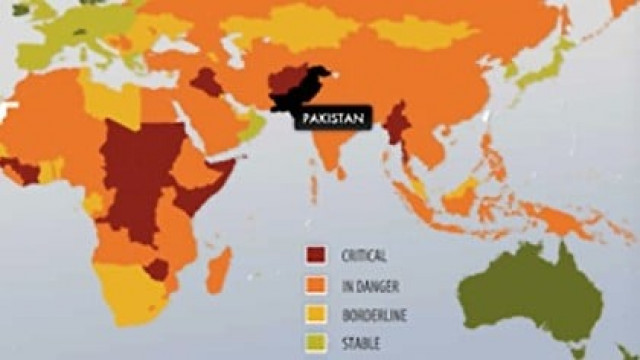The term “failed state” has been thrown around with wild abandon for quite a while now and has only grown in popularity and public prominence since Foreign Policy magazine, in partnership with US think tank Fund for Peace, started publishing its annual Failed States Index in 2005.
But what does it mean to be a “failed state” and what is the real impact of this index?
The ranking is based on the total scores of 12 indicators. For each indicator, ratings are placed on a scale of 0 to 10. The total score is the sum of the indicators and is on a scale of 0-120. (More information on the indicators can be found here.)
My initial qualms are simple. How comprehensive can the tracking and monitoring of these indicators possibly be for each of the 177 states included in the 2010 index? How much access are researchers going to get to a country like North Korea, for example? How many hours of work would it take to be able to effectively establish a comprehensive rating of 12 indicators for 177 states within a reasonable time frame?
Putting that aside, even the structure itself is flawed. There are too many problematic examples for a single blog post but here’s one. All 12 indicators are weighted equally. One of the indicators is “progressive deterioration of public services.” Okay, that’s pretty important. But what about the equally weighted “rise of factionalized elites,” described, in part, as “use of nationalistic political rhetoric by ruling elites?” I can see how that could be dangerous but it’s also pretty arbitrary and I can certainly think of worse things. That means a country with no nationalism but no public services whatsoever, and a country with sparkling public infrastructure and lots of flag-waving will be ranked equal in terms of being “failed.”
Also, how these indicators are squeezed into a rating out of 10 is beyond me. How do you assign an entire country a rating for “legacy of vengeance-seeking group grievance or group paranoia?” What gives Pakistan a rating of 9.4 in this category versus Iraq’s 9.3?
The index is obviously flawed, but it’s impossible to create a perfect index that will sum up how 177 countries ‘failed’ to live up to a contrived ideal of perfect statehood. Which begs the question, should we even be trying? I understand that this is full of political bombast. A magazine that can tell its readers which states are ‘the worst’ and which states are ‘the best’ is surely useful. But also, surely harmful.
The danger arises when what the index says is compared to what people perceive it to be saying. The words ‘failed state’ set off massive psychological alarm bells, they tell potential tourists to avoid the country at all costs, they tell potential investors to put their money elsewhere and they inform the general language and framework of public debate about these countries, something that can be very damaging in the long run. When your average FP-reading punter reads the words “failed state” they don’t immediately question the methodology, they just hear massive alarm bells ringing in their head screaming “DANGER DANGER OMG!!!” These crushingly important perceptions can swiftly become prejudices when one considers how little thought your average reader puts into critically analysing the index itself.
These problems are exacerbated further by the articles FP prints to go along with the index. Check out, “Postcards from Hell,” a series of wonderfully clichéd images of starving African people, shifty-looking ethnics with AK-47s, ominous burqas and random fire. These images have all the intellectual depth of a Michael Bay movie and do little but promote flawed pigeon-holing of entire nations into neat boxes marked “poverty” and “danger”.
Things are made worse by charmingly worded accompanying captions, the writer of which seems to have trawled the thesaurus for every possible synonym of ‘bad’ but provide very little by way of explanation. For example, the caption under 32nd most failed state, Iran reads: “Clashes broke out in Tehran after a disputed June 2009 election saw President Mahmoud Ahmadinejad claiming victory over his main challenger, Mir Hossein Mousavi,” which doesn’t tell me much about why Iran is any more ‘failed’ than number 33, Liberia.
Then there’s the ‘analysis’. Robert Kaplan’s piece, quaintly titled “Actually, it’s mountains”, a stinker that was seemingly faxed-in after a 45 minute session with the Encyclopaedia Brittanica, stands out for me. Kaplan spends most of the article harping on about the problematic geographies of the countries on the list and then rounds it off with a hopeful-sounding “None of these places is doomed. Human agency can triumph over determinism.” Thanks, Rob, I feel a lot better. I suggest a new title: “Actually, it’s lazy.”
Or what about George Ayittey’s “The Worst of the Worst“, a list of a bunch of terrible dictators and all their evil transgressions. Once again liberally applying the thesaurus, Ayittey goes through his list with wild abandon, brutally deriding the “bad dude dictators” and “coconut-heads,” and mercilessly cutting them down with the sword of Western Reason while riding past on his high horse.
But what is the use of all this sensationalism? We are told that Mahmoud Ahmadinejad is a bad man but there is no analysis of the complex Iranian political system where most power (including foreign policy and control of the armed forces) actually rests with Ayatollah Khamenei. We are told that Hosni Mubarak is a bad man but nowhere is it mentioned that his regime is propped up entirely by the US government. And that’s just the basics, there’s no in-depth analysis anywhere suggesting that maybe Iran is seeking a nuclear deterrent to Israel, or that Uzbekistan was used by Bush as a staging post for the War on Terror, thus giving Karimov legitimacy, or that Mubarak’s torture was not only approved but taken advantage of by America’s use of extraordinary rendition. Nope. Nada. Just lots of bad men and ‘failed states’.
And therein lies the problem with their entire concept. There is far too much weight behind the two words “failed state,” and too many conflicted definitions, to entrust the definitive explanations of entire nations to a few scantily-analysed annual magazine articles. Readers, do yourselves a favour: next time you read somewhere that a state is ‘failed’ or a head of state is ‘bad’, or a ‘dictator’ or a ‘coconut-head’, ask why. Because until we start asking why and actually analysing the global situation in a broader manner we will never find real solutions, just constant fear and further entrenchment of damagingly simplistic binary assessments of entire peoples that many already perceive as ‘the Other’.
This post was originally published here.
What does it mean to be a ‘failed state’?



COMMENTS
Comments are moderated and generally will be posted if they are on-topic and not abusive.
For more information, please see our Comments FAQ